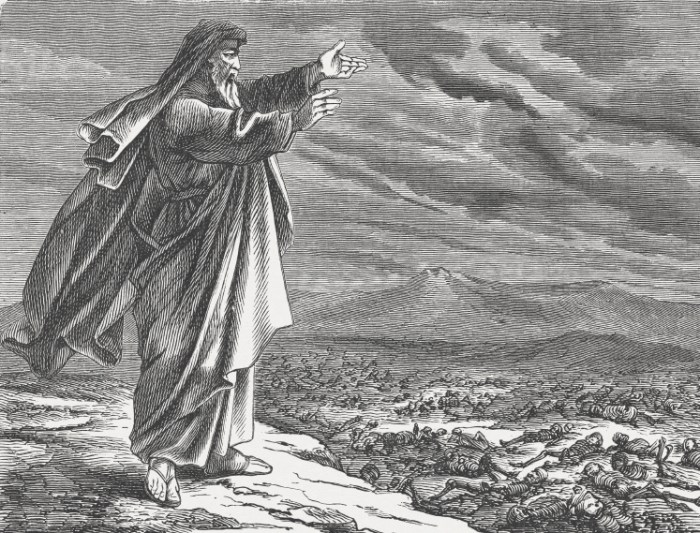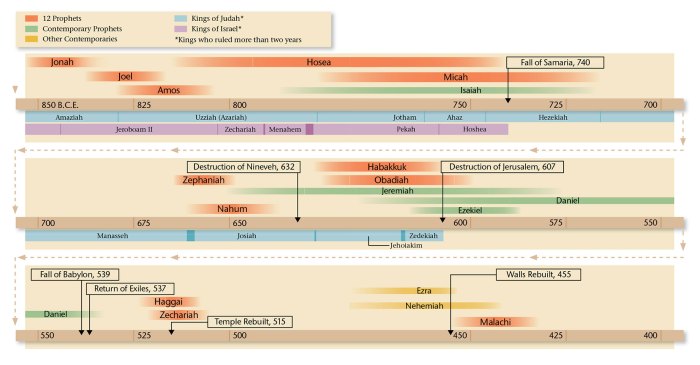Biblical prophets exclusively predicted future events. – Biblical prophets exclusively predicted future events, a remarkable phenomenon that has captivated scholars and believers alike. From ancient Israel to the present day, these enigmatic figures have left an indelible mark on religious thought and practice.
Prophets played a pivotal role in ancient Israel, serving as divine messengers and interpreters of God’s will. They denounced social injustice, proclaimed impending judgment, and offered hope for the future. Their prophecies encompassed a wide range of topics, including political events, military campaigns, and the coming of the Messiah.
Historical Background of Biblical Prophets
The prophets played a crucial role in ancient Israel, serving as intermediaries between God and the people. They were called to speak on behalf of God, delivering messages of judgment, hope, and guidance.
There were different types of prophets with varying functions. Some, known as “seers,” received visions and revelations from God. Others, called “spokesmen,” conveyed God’s messages through preaching and writing. Well-known biblical prophets include Moses, Elijah, Isaiah, and Jeremiah, whose prophecies had a profound impact on the history of Israel.
The Nature of Prophetic Predictions: Biblical Prophets Exclusively Predicted Future Events.

Prophecy, in biblical literature, refers to messages delivered by prophets on behalf of God. These messages often predicted future events or conveyed God’s will and purpose for his people.
There are different types of prophecies. Conditional prophecies were dependent on the actions or responses of the people, while unconditional prophecies were absolute declarations of God’s intentions. Prophets received messages through various means, including visions, dreams, and direct communication from God.
The Content of Prophetic Predictions

Biblical prophetic predictions covered a wide range of topics. They addressed issues of morality, justice, and social order. Prophets often foretold future events, such as the rise and fall of nations, the coming of the Messiah, and the end times.
Common themes in prophetic utterances included calls for repentance, promises of restoration, and warnings of judgment. Specific prophecies, such as Isaiah’s prophecy of the suffering servant (Isaiah 53), found remarkable fulfillment in the life and ministry of Jesus Christ.
The Interpretation and Application of Prophetic Predictions

Interpreting prophetic texts can be challenging due to their symbolic language and historical context. However, scholars employ various methods, such as textual analysis, historical research, and theological reflection, to gain insights into their meaning.
Prophetic predictions have been applied throughout history in different ways. Some have been used to guide religious beliefs and practices, while others have influenced political and social movements. The interpretation and application of prophecies remain an ongoing process, with ongoing debates and discussions among scholars and theologians.
Comparative Analysis of Prophetic Predictions
Biblical prophets can be compared to prophets from other religious traditions. While there are similarities in their roles as messengers of divine messages, there are also notable differences in their messages and methods.
Biblical prophets emphasized ethical monotheism, focusing on God’s holiness and his covenant with his people. Their predictions often carried a strong moral and ethical dimension, calling for justice and righteousness. In contrast, some prophets in other traditions may have focused on more mystical or supernatural aspects of their roles.
FAQ Explained
What distinguishes biblical prophets from other religious figures?
Biblical prophets were exclusively able to predict future events, a gift not shared by other religious figures.
How did prophets receive and convey their messages?
Prophets received messages through visions, dreams, and divine inspiration. They conveyed their messages through spoken words, written texts, and symbolic actions.
What were the common themes in prophetic predictions?
Common themes included divine judgment, repentance, restoration, and the coming of the Messiah.